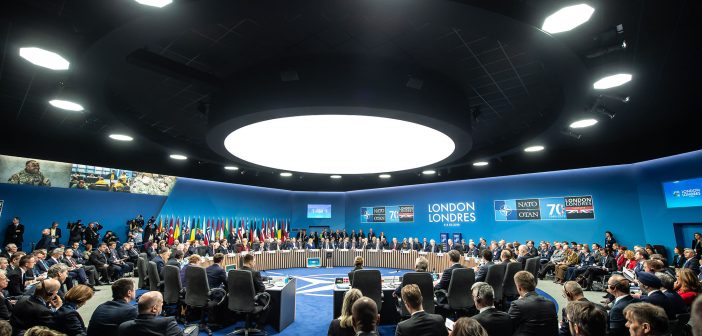By EJ Herold
WASHINGTON — The American author Samuel Clemens, better known as Mark Twain, responded to his pre-mature obituary that, “The report of my death was an exaggeration.”
So, too, the current handwringing over NATO’s future, after recently celebrating its 70th anniversary.
Critics see the Alliance in its dotage, suffering irrelevance, but a more optimistic view can accompany the Defense Ministers meeting this week in Brussels.
Formed from the rubble of World War II’s cataclysmic impact, the North Atlantic Treaty was signed in 1949 by national leaders intent on building peace and prosperity and preventing future war.
Along with other symbols of international cooperation (e.g. United Nations; International Monetary Fund; World Bank; and European Coal and Steel Community-the predecessor to today’s European Union), the North Atlantic Treaty Organization embodied the hopes of a war-weary world for a more stable future.
Certainly, NATO’s first 70 years have been marked by many challenges, stresses and strains on its unity. Through the Cold War, Suez and Cuban Missile Crises, Balkans Campaign, attacks of 9-11, Afghanistan and numerous other challenges, NATO has guaranteed the peace of the Euro-Atlantic area through its deterrent strength and its multinational diplomacy.
NATO Secretary General Jens Stoltenberg proudly states that, “NATO is the strongest, most successful Alliance in history.”
Today, NATO advertises itself under version 3.0, a forward-looking orientation to renewing the strength and readiness of its forces while addressing emerging challenges that confront the Alliance.
If versions one and two addressed Cold War challenges and out-of-area operations, this third incarnation reinforces the solidarity of the Alliance through increased readiness, strengthened capabilities and credible deterrence to face new challenges.
Notably, the Allies are engaging in new domains (space and cyber), reinvigorating the command structure and the political controls governing it, recognizing new competitors (China) and facing old adversaries (Russia) with firmness and resolve. There is much to be optimistic about in NATO’s agenda.
While the press reports on high-profile criticisms and disagreements among leaders, less well-known is the daily effort by dedicated public servants to build consensus among nations — the sine qua non of NATO’s unity.
The physical proximity of national representatives and international bureaucrats in a state-of-the-art headquarters creates an environment of collaboration and collegial negotiation that is unrivaled.
Whether in formal meetings, casual discussions, incidental contacts at meals or chance encounters in the many open spaces, Allied and NATO Officials have constant opportunity to discuss, consider new ideas, and seek consensual solutions to the most challenging issues.
Vigorous debate on difficult topics is the hallmark of NATO collaboration and a primary reason to remain optimistic for NATO’s future.
Issues dividing nations in the past, potentially leading to armed conflict, are today resolved through debate and compromise by nations sharing values and a common desire to maintain peace, prosperity and security for all members.
Allies are developing capabilities together that they cannot deliver alone, and the number of cooperative efforts is greater than ever.
The Alliance is more forward-looking, more engaged and more unified than criticism reflects, even though significant issues remain to be resolved. With Allies working together to find peaceful solutions, there is much more to celebrate than criticize.
The Alliance is still attracting members. Soon NATO will welcome its 30th member, the Republic of Northern Macedonia, once all parliaments have ratified its accession. Allies confirmed the open door to further aspirants and work with candidates to guide them toward membership.
Current members are delivering on the 2014 Wales Summit Defense Investment Pledge to increase their defense spending and recapitalization budgets, enhancing readiness and the deterrent value of NATO forces.
But NATO’s future must be constantly reviewed and vigorously defended. High-profile criticisms are not new, though Allied leaders questioning NATO’s value do undermine confidence in long-standing security guarantees.
That said, a December about face by President Trump, to defend NATO and suggest a greater role for it in the Middle East, is positive affirmation of NATO’s continued importance.
The coming Defender 2020 Exercises showcase continued US commitment to Alliance security and the recent Pew Trust survey of popular support for NATO is open to optimistic interpretation, as well.
Unity must be defended daily as an intrinsic good.
The evolution of threats from kinetic action to cyber intrusion or orbiting surveillance mean that vigilance, resilience and adaptability are imperative. Member nations have important obligations to their populations, as well as their allies.
They must build their strength, increase citizens’ understanding of threats, and ensure the effectiveness and redundancy of their defensive systems, as a deterrent for potential adversaries and competitors.
Through individual strength, nations are stronger together in an alliance of shared values.
Though there are many challenges facing NATO, and the way forward remains difficult in an uncertain environment, there is demonstrated enthusiasm to achieve these objectives at NATO.
Rather than the eclipse of NATO after 70 years, I see an organization enthusiastically reinventing itself for a new era.
E.J. Herold is a former NATO Deputy Assistant Secretary General for Defense Investment, currently living and working in Washington, DC.




